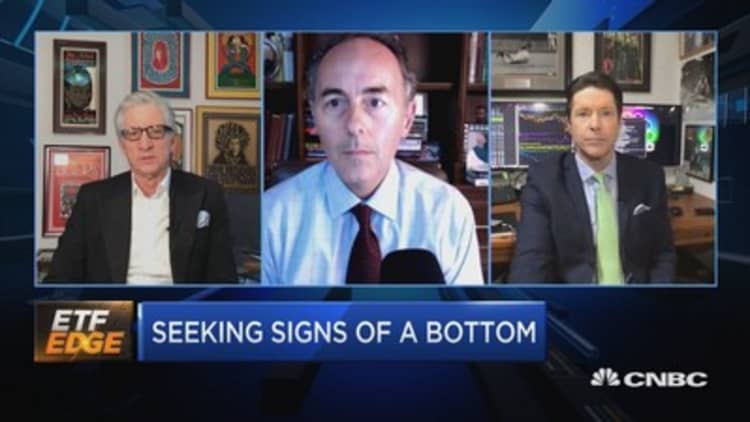
The stock market's coronavirus-fueled declines might just end in deja vu.
That's what Jan van Eck, CEO of Van Eck Associates, told CNBC's "ETF Edge" on Monday about the likely path to recovery for U.S. stocks.
"We've gone through a really important phase shift," said van Eck, who is also CEO of the VanEck Vectors ETF Trust.
"In the first phase, the only thing that mattered was what happened to the virus. The central bank could cut rates and whatever. It just didn't matter. The market kept falling," he said. "I think we are now past that period of heightened uncertainty where normal stuff matters like Fed stimulus."
Stocks are up month to date despite ongoing concerns about the pandemic's impact on the U.S. economy, accentuated by soaring jobless claims and predictions of a domestic or global recession. The S&P 500 has climbed nearly 7% in April amid the Fed's unprecedented moves to save the economy, though it's still down about 14.5% this year.
"We know from China, their statistics — they're about a month ahead of us — are not that encouraging. While traffic is at 97% use, the public transportation use is only at 60%. So, we've got a long ways to go before the economy starts recovering," van Eck warned.
"But we've got this new era of tremendous Fed stimulus, and the markets are reacting to that," he said. "So, I think the playbook is kind of a replay of '08-'09, where you just have a lot of central bank stimulus and maybe asset prices melt up in advance of the economic recovery. That's my provocative thought for the day."
Tim Seymour, founder and chief investment officer of Seymour Asset Management, had his eye on the commodity markets for signs of green shoots.
"I think copper is certainly something we want to be watching," he said in the same interview.
Copper is seen by many as a reliable barometer for the global economy given its wide range of uses in consumer-facing and other industries. The price of copper was up less than 1% early Tuesday.
"Of all the major commodities, and certainly those that are the most cyclical, [copper] is probably the most in balance and probably the one that I think ultimately could be the real tell on where supply-demand, but really the demand factors, are going to weigh through," Seymour said. "So, watch copper for sure."
Macroeconomic data is also worth watching, said Seymour, a CNBC contributor.
"You did get some ... manufacturing numbers out of China," he said. "You even got some numbers out of Taiwan, who didn't close down their economy the same way the rest of Asia did, and they were significantly better. So, you have at least these mileposts in terms of global economies that might be coming out of this first."
As for commodities more broadly, Seymour reminded investors that "commodity prices always overshoot" in times of financial stress.
"You don't want to buy commodities when they're cheap. You want to probably buy them when they're expensive," he said. "But ... I think we've gotten a case where you are building a base and, in fact, the energy outperformance in the equities over the last couple weeks … isn't a straight line, but I think you can stay there. I feel pretty good about that move."
Crude oil prices slipped Tuesday as investors remained skeptical that the OPEC+ agreement to record supply cuts would help stabilize the market.





